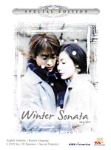NEW CONTEST FOR A FREE EDITION! SEE HERE
Winter Sonata
Directed by Yoon Suk Ho
Written by Kim Yoon Hee, Yoon Eun Kyung & Oh Soo Yun
Originally aired in Korea SBS2
January 14 to March 19, 2002
|
|
||
Cast:
Choi Ji Woo as Jung Yu-jin
Bae Yong Jun as Kang Joon-sang
Bae Yong Jun as Lee Min-hyung
Park Yong Ha as Kim Sang-hyuk
Park Sol Mi as Oh Che-lin
Review by Leonard Norwitz
Studio:
Production: KBS Television, Korea
Video: YA Entertainment (USA)
Video:
Aspect ratio: 4:3
Region 1: NTSC
Feature: 480i
Supplements: 480i
Audio:
Korean DD2.0
Subtitles:
Feature: English
Extras: English
Extras:
• Interviews, Bloopers, Behind the Scenes (1 hour) [480i]
• Photo Gallery (about 60 publicity scrapbook snapshots of the cast, and an assortment of candid shots around the set.)
• Synopsis
• Character descriptions
• Bios on Cast & Crew
Presentation
20 episodes, approx. 1 hour/episode
Extra features: 1 hour + stills
1 box set, 2 volumes, complete on 6 discs
Release Date: July 10, 2007
Winter Sonata ~ Comment
(see Introduction to Korean Drama HERE)
Winter Sonata is the series that started the Korean Wave, ensured stardom for its two leading actors, and instigated a fashion in scarves and turtle necks. While it was successful in Korea in its initial run (averaging a 20% share) the show became so popular in Japan the following year that it was aired once again in both Japan and in Korea – an exceedingly rare occurrence. With the release of the original DVD and soundtrack CD, the show's place in legend was assured. By this time, Winter Sonata began to take hold in Hawaii and eventually swept across the U.S.
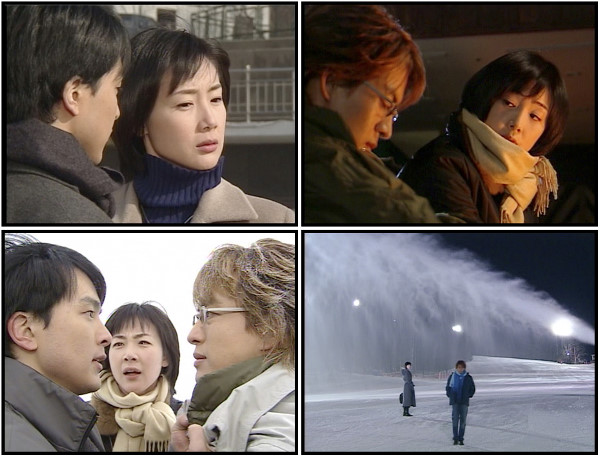 |
Much has been written elsewhere as to why and how Winter Sonata jumpstarted a worldwide interest in Korean television drama: the actors, the story, the locations, the scarves. Whatever it was, this series caught on across the Pacific Rim - which led me to wonder if Charlie got much USO? – I refer you to this article about the official North Korean position on South Korean television, published by Radio Free Asia HERE and this unconfirmed report this past September HERE.
Perhaps the very discrepancy with which this sort of drama is entertained in the two Koreas explains in some measure the emotional response to it. Before Winter Sonata had aired its final episode, it's two main stars, Choi Ji Woo and Bae Jong Yun were already being treated with the kind of adoration usually reserved for superstars. (To get a flavor of this, be sure to visit the Extra Features included with this set.)
The advertising for Winter Sonata emphasizes the idea of a love so strong that it persists even after the death of one of the partners. While this is hardly a novel idea, the very fact that it is the stuff of so many Korean dramas, or is at least seen that way – has to mean something more than simply a reflection of fashion. My take is that it has more to do with contemporary Korean history and the horrific split these people have had to endure for the past 50-60 years.
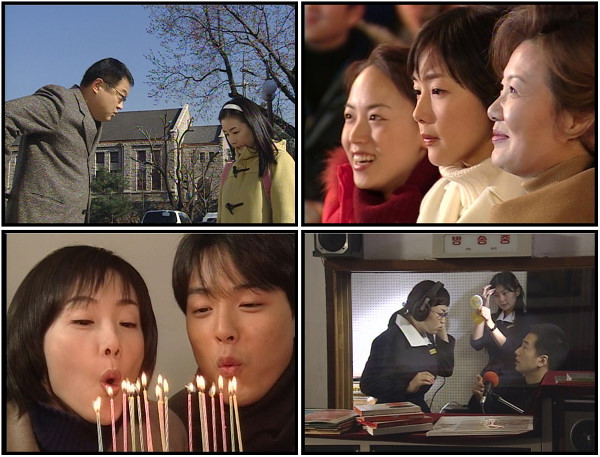 |
Few dramas demonstrate the difference between Asian – and, specifically, Korean – attitudes about obligation – and, specifically, family obligation - as Winter Sonata. To take just one example, if it is the wish of the parents that their grown child will marry so and so, then marry so and so they shall. Even in modern Korea – and keep in mind South Korea has better Wi-Fi connectivity than any comparable area anywhere else on the planet – a child cannot, with impunity, do as they please with their lives if it does not correspond to the desires of the parents and, just as important, the grandparents. (The 2004 film, My Little Bride, is a satirical take on this very attitude.)
In the world of Winter Sonata, and contrary to what most Westerners imagine would be the case, emotions are right at the surface – and even then, it is obvious that more intense emotions are still held back. Crying and apologizing is the order of the day. People apologize right and left in this story – as if for their own existence. And well they should, since they are painfully aware of the conflict of obligations that informs their lives.
The advertising, the extra features, and the plot and character descriptions on this DVD suggest quite a different picture of the drama than I see – or perhaps they take the angst for granted. Much of Winter Sonata is awash in pain, and there is hardly a single character that isn't consumed by it: the four main protagonists especially. Of course, there would be no drama without conflict – but there's more to it than that. Expectations, hopes and dreams are dashed not only or so much by the whims of accident as by the commitment people have to expectations: Sang-hyuk and Yu-jin are juniors in high school, but have been close friends since day one. Their families are close. Sang-hyuk imagines a future with Yu-jin by his side always. She loves Sang-hyuk but does not see him as her boyfriend. Sang-hyuk is perfectly content to go on forever in this fantasy until the arrival in the first reel of a pretender to Yujin's affections.
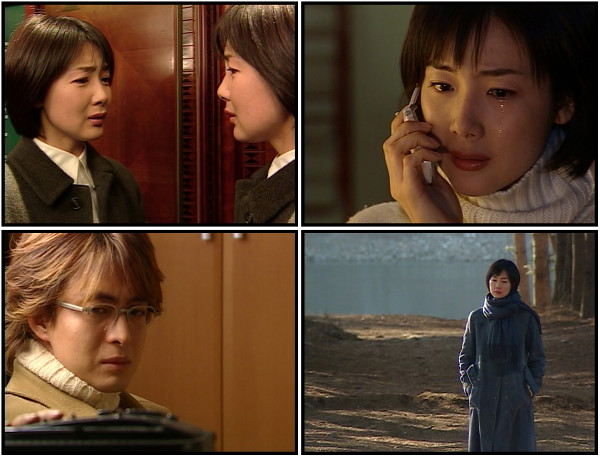 |
The pain that Sang-hyuk feels is not simply the potential loss of Yu-jin, but to his lifelong assumption that they would marry and be together forever – an assumption shared by both their parents. He is the character few people talk about when they speak of what draws them to the series – yet he is the most like the rest of us: he is absolutely committed to his expectations. His love of Yu-jin is more possessive than protective, and is profoundly connected to his fear of losing her, for it would also mean the loss of his dream. (Does any of this sound familiar?) Yu-jin, on the other hand, is deeply conflicted by her sense of familial duty and by her attachment to her unconsummated love for Joon-sang. Both she and Sang-hyuk are driven by what could have been and what should have been. To the extent that Winter Sonata is a fairly tale, it is one where all its protagonists walk through fire to the very end.
Winter Sonata could not have worked the magic it had were it not for its cast, and particularly its two stars, Choi Ji Woo and Bae Yong Jun. Bae Yong Jun has an unusual look: soft and strong, which works quite well for both the characters he plays here. Kang Joon-sang's pain is very much on the surface. He is angry that his mother has kept his father's identity from him and jealous that the son of the man he believes is his father has a loving and complete family life. The decidedly more outgoing and confident Lee Min-hyung is taken for Joon-sang by Yu-jin, yet is torn between the person he believes himself to be and the desire for this woman. For such men to risk love and make that believable takes real skill as an actor.
In Up Close & Personal Robert Redford says appreciatively of Michelle Pfeiffer "She eats the lens." It's a great line, though wasted on the right person at the wrong moment in the wrong movie. It's a sentiment that could not be said of Choi Ji Woo in Winter Sonata. The difference, of course, is that Michelle's character, a TV news personality, is required to look into the lens, and Ji-Woo's must not. The actress must be aware of the camera in either case, but since Michelle's observer insists on constancy, we are quickly bored, despite the actress's beauty. Michelle's character's relationship to the camera is more direct and quite literally self-conscious. Most film actresses assume this liability even if their characters don't. Ji-Woo, on the other hand, wants to reveal her character to us through the camera. She must understand the camera, but then must ignore it for the next twenty hours. We must have the feeling that there is nothing, absolutely nothing, between her and us. Like few film actresses I have seen before – Barbara Stanwyck, Vivien Leigh, Ingrid Bergman - this is her gift. To be able to watch Choi Ji-woo at her best, as she is here, is a mind-altering experience.
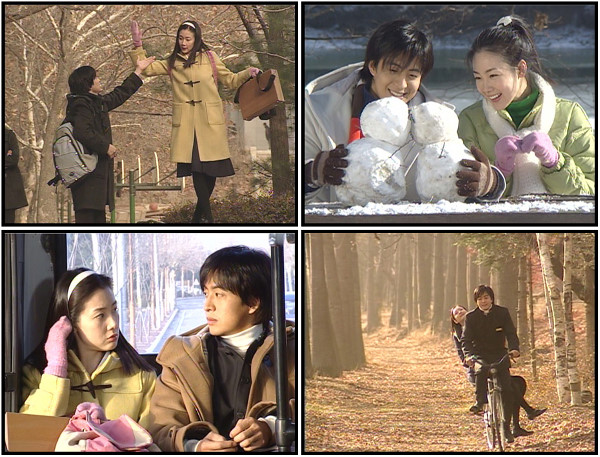 |
Winter Sonata
The Score Card
The Series : 9
Yu-jin and Sang-hyuk have been childhood friends, though not exactly sweethearts, since birth – their parents had been close friends as well as alumni of the same high school. Joon-sang is the new transfer student from Seoul. Though whiz bang in math, he has a personal agenda that does not include joining much of anything. In fact he is something of a boor. All the same, something about him strikes a sympathetic chord in Yu-jin, not least that they lost their fathers at about the same age. (Oh-oh!) When Yu-jin takes Joon-sang's helping hand - something she had refused to do when offered by Sang-hyuk – we know that she has taken the fatal step. One thing does not quite lead to another, however, as Joon-sang is pretty much dusted in a traffic accident by the end of the second episode.
The rest of the series picks up the story, starting ten years later. Despite the passage of time, Yu-jin has only just now agreed to marry the long-suffering Sang-hyuk when she sees someone who bears a striking resemblance to her lost love. Lee Min-hyung has recently come to Korea from America where he is taking up the reins of a company about to build a new ski resort for which the designer is – you guessed it – Jun Yu-jin. Well, that's about as funny as this drama gets, aside from the usual bits of comic relief by a best friend or two. Sang-hyuk is not amused – in fact, he is driven to lengths to keep what he feels is rightfully his that surprise even him in his more sober moments. Yu-jin is in danger of losing her mind as she becomes completely obsessed with this grave robber from across the seas. Min-hyung seems to be utterly clueless about this melodrama, as if he just walked in after the first dozen reels, which he did. Meanwhile both sets of "in-laws" press her to follow through with her commitment to Sang-hyuk, regardless of her fanciful infatuation – or, is it?
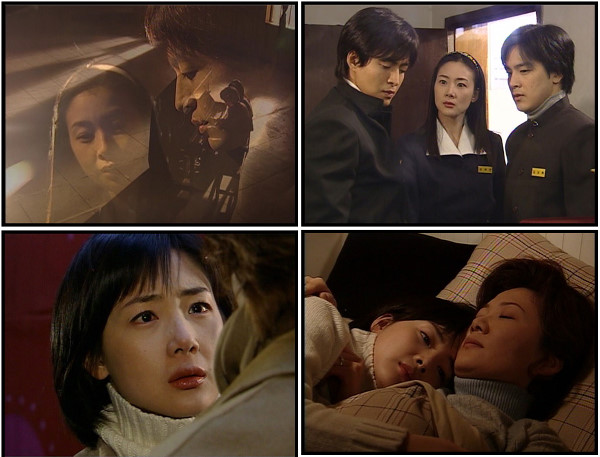 |
Edition: 9
Under the terms of the license from KBS, and presumably to preserve everything possible from the "original edition" for its fans, no changes in image color or contrast, menu design or translation were permitted. Even though the boxes themselves are different (very much in favor of the more solid YAE), the front cover art is much the same – again, the result of contract. I checked out a few scenes to see if the video and translation were identical – and as near as I could tell, both have much the same color, contrast, and tendency to show artifacts, and nearly the same bit rates.
The original KBS R3 edition is a 7-disc affair, while the YAE has 6. The distribution of episodes is also the same: four episodes per disc for discs 1-3; three episodes per disc for discs 4 & 5; and two episodes plus Special Features on disc 6. The R3 edition includes a bonus CD of the original soundtrack.
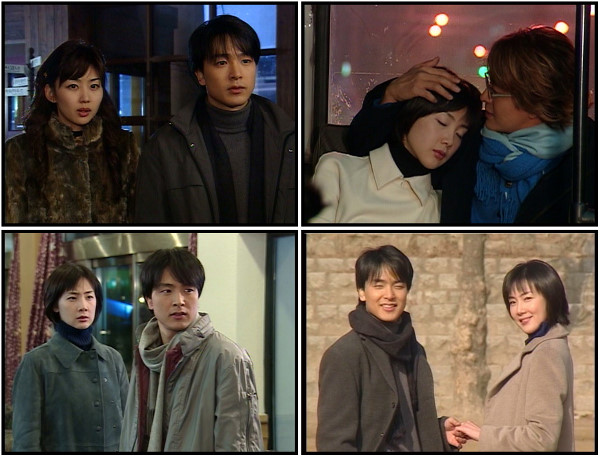 |
Image : 6.5 (5~7/8)
The score of 7 indicates a relative level of excellence compared to other standard definition DVDs on a 10-point scale for SD DVDs. The score in parentheses represents: first, a value for the image on a 10-point scale that accommodates both standard and high-definition DVDs – where any score above 7 for an SD is outstanding, since the large majority of high definition DVDs are 8-9.5. The second number in parentheses indicates how that image compares to what I believe is the current best we can expect in the theatre or, in the case of made-for-TV fare, as first shown on television. Despite the opening widescreen sequence that precedes the main menu, the series was originally filmed and broadcast in 4:3 standard definition. YAE receives Digital Beta 1:1 copies made from the tapes used for broadcast. Variations in quality from one YAE production to another is largely the result of the care taken in storage and transfer in Korea.
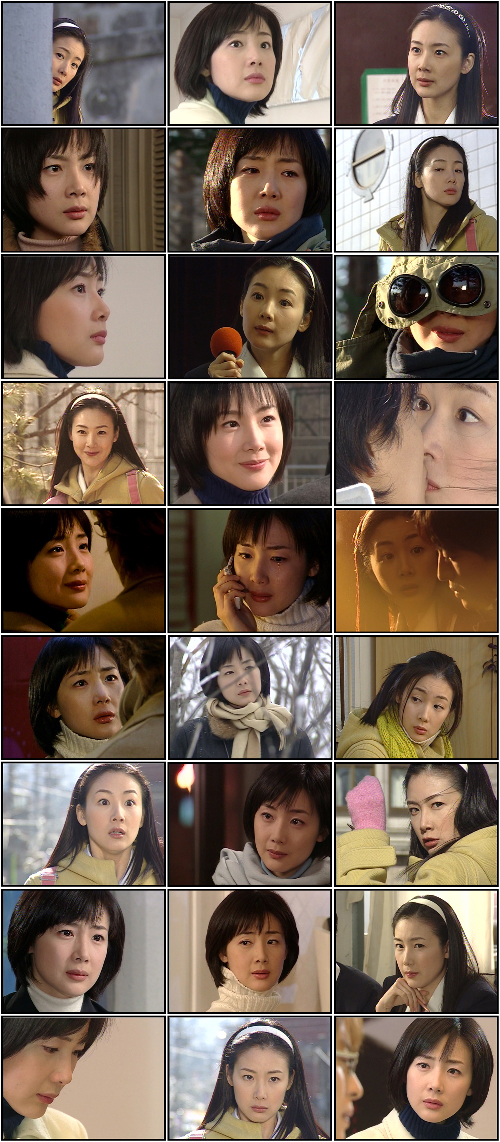 |
Image quality varies considerably from scene, though it is largely a matter of contrast rather than sharpness (which is usually quite good), and affects outdoor scenes more often than indoor shots. As students race across the campus, each shot has jarringly different contrast. I suspect this is due to how rushed the project was (I am told that the last episode was being written as it was shot and that what post-production it received was sorted out the day it was due at the studio for broadcast.) In the first episode, we can see the overhead microphone intrude into the frame – I counted five instances – and in one scene you might even notice the gaffer holding the mike boom at the far left corner. It occurred to me that in all these cases, the offending bit of technology could have been easily digitally removed, but wasn't. That said, such errors are largely limited to the first episode. By the way, I didn't observe that image quality suffers in the first three discs, despite their containing over four hours of program as compared to the remaining discs, which have only three.
Audio & Music : 7/9
Our observation of the intrusive microphone confirms what we already suspect: that nearly all of the dialogue is live, and not looped. The effect of this inevitably leads to a more intimate connection with the characters. The dialogue track is not stereo, but the music is. The musical score is fabulous, striking just the right mix of whimsy and regret, but is overused, for which I took off a point. No wonder that it sold a million copies in Japan alone.
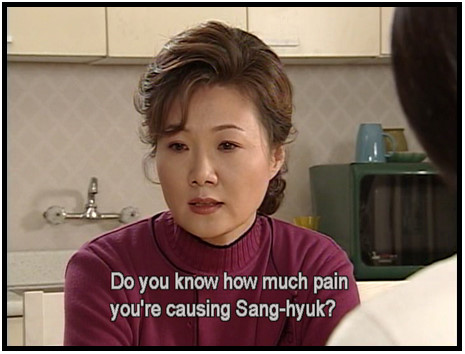 |
Subtitles & Translation : 7
This is one instance where the translation was not provided by YAE. Under the terms of the license, no changes in the translation were permitted. For the most part I thought the English rendering good enough to understand what was going on and why, and only rarely got confused by a discrepancy between the word and the action. Good example: in Episode One, Joon-sang and Sang-hyuk have an altercation on the volleyball court. Joon-sang calls Sang-hyuk a "Bookworm!" which nearly leads to an exchange of blows. Somehow I can't get my mind wrapped around the idea that being called a "bookworm" could have such dire consequences. The subtitles are white, outlined in black, readable, a bit large and intrusive for a projected image, but for most applications, they should do just fine.
Operations & Box Design : 6
After a brief montage that includes letterboxed widescreen images (just to torment us, I assume) we are led to a bare bones menu that permits play of the disc straight through or beginning with the chapter or scene of your choice. It took me some while to notice that the episode number is at the upper left of each set of four scenes. Since the chapter numbers are continuous throughout the entire series, I felt the obscure placement of the episode number to be as unreasonable as it is not intuitive. As noted earlier, YAE was not permitted to change this peculiar structure. Curiously, there is no subtitle submenu. The default is English subtitles, but they can be removed or reinstated from the remote.
Extras : 7
The Extra Features in this set (which are not subtitled in the KBS R3 edition) are an indispensable part of this edition. The main function of the 60 minute behind-the-scenes segment is to dramatize and underscore the mid-season popularity of the series. There is really nothing quite like this on American television, fan magazines notwithstanding. Think of Beatlemania, and you have a rough idea of excitement that Winter Sonata would generate over the following two years. Korean tourism in general has gotten quite a boost from series like Winter Sonata and Dae Jang Geum. A short piece on how this series has popularized one or two of the locations - most notably Namiseom (Nami) Island - is not to be missed. To get a quick idea of the extent of the phenomenon, check HERE.
Part of this segment is a 30-minute collection of Bloopers. Ordinarily, I find bloopers to be hopelessly inane. The idea would seem to be to show how human celebrity actors can be – not only that they can make mistakes, but to be silly when they do. When American actors goof, they just go immediately into another acting state. By contrast, Korean actors appear to take self-consciousness to an entirely different level. In some ways, I am surprised that they can so easily get into another character, for when the seams show, as happens when they forget their lines or get their hair caught on a tree branch, they are genuinely and delightfully embarrassed. Beyond this, many Korean actors, especially the women, seem uncomfortable to be seen at all outside of their roles, as when they make appearances on fan club TV shows. It isn't that they are afraid of fame or to be shown up as human or commonplace – quite opposite: that they are genuinely bashful – not shy, exactly, but uncomfortable with the acknowledgment of their special talents and the extent to which others are affected by them. It's fascinating to watch them – something like going to the zoo, only I can't shake the feeling that I'm the one in the cage.
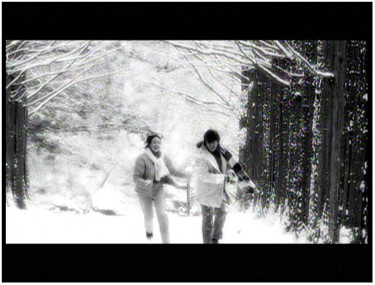 |
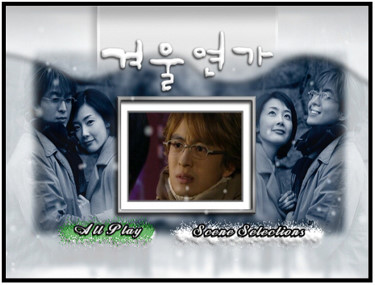 |
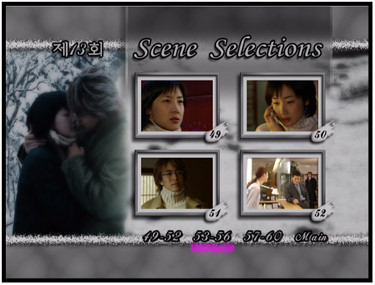 |
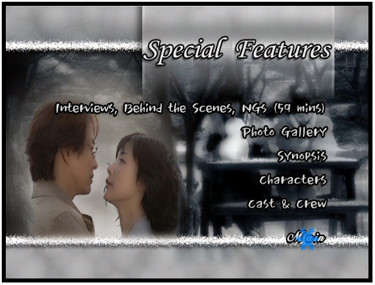 |
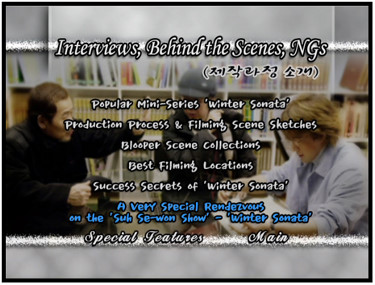 |
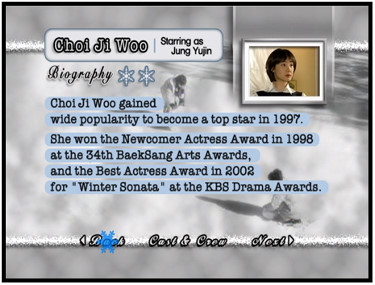 |
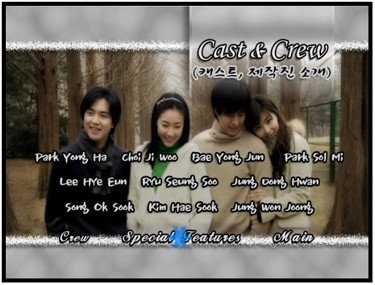 |
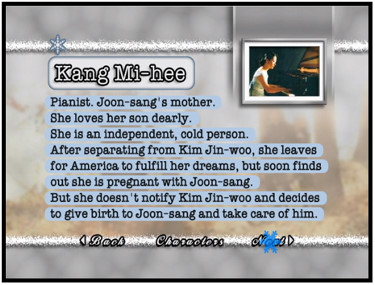 |
Recommendation: 10
I watched Winter Sonata for the first time a year ago, and was a little surprised that watching it again so soon would be as engaging – more so, in fact. I shouldn't have been surprised. The story, the settings, and especially its heartfelt performances strike a chord – several, actually – that bears revisiting. Sure, there are fairy tale aspects to Winter Sonata, but that is only part of the attraction, for fairy tales speak to a part of us that is not all that rational. I urge you to not go to your grave without knowing how this part of the world thinks and feels. Along with Dae Jang Geum, Winter Sonata should be an essential part of your cinema experience.
Leonard Norwitz
LensViews
December 2nd, 2007
RULES: Given "Random
Harvest" I suspect James Hilton would have liked "Winter
Sonata". What do these these two stories have in common?
The winner, who will receive a free copy of the complete series, Winter
Sonata, is:
• Robert Cagle
Fisher, IL
The runners-up will each receive a DVD of episodes 1-3 of a different
popular Korean drama (Sorry, the distributor is out of Winter Sonata
samplers for the indefinite future.)
• Nick S.
Baldwinsville, NY
• Paul K
Lindenwold, NJ
• David C
Millersburg, OH
GOOD LUCK ALL!

